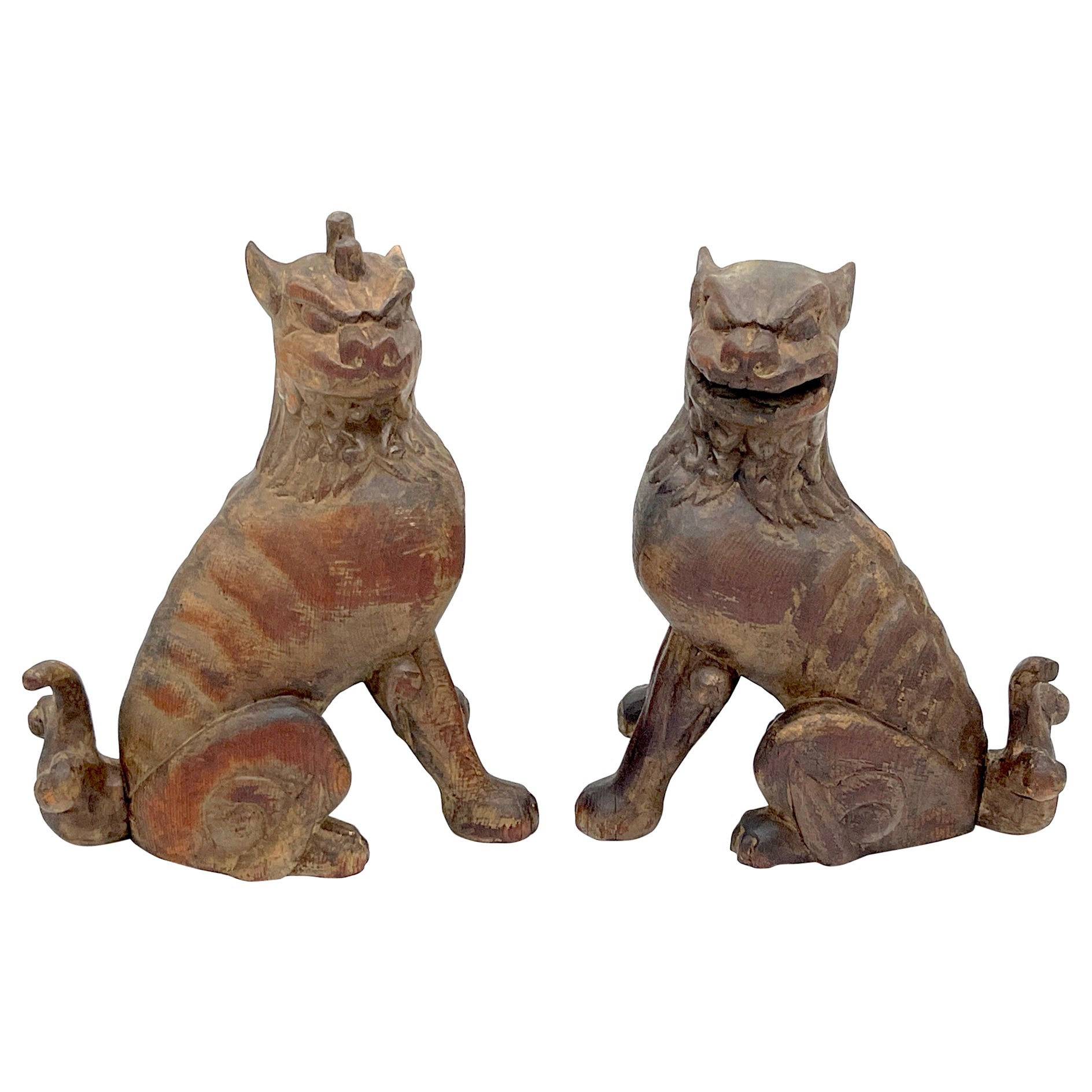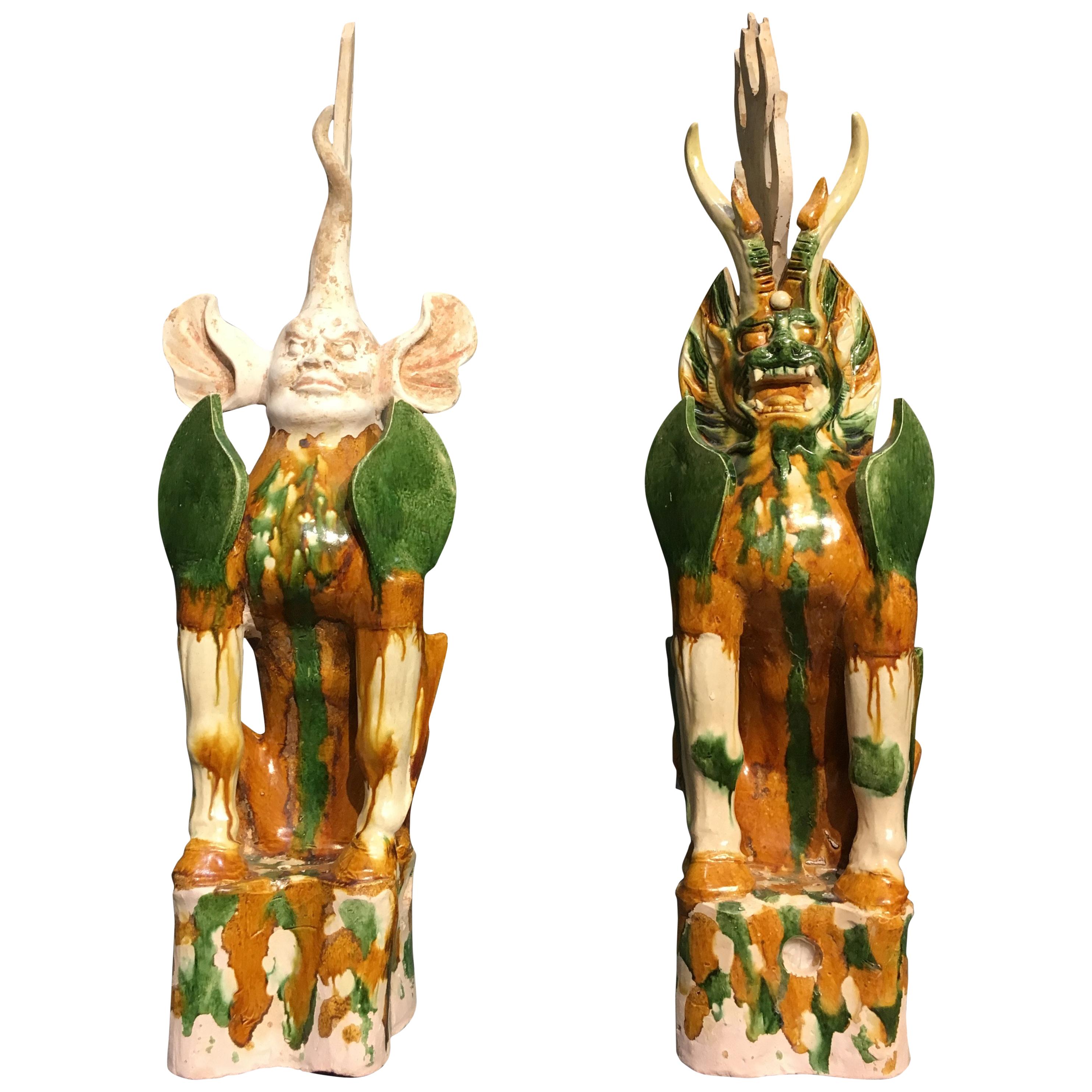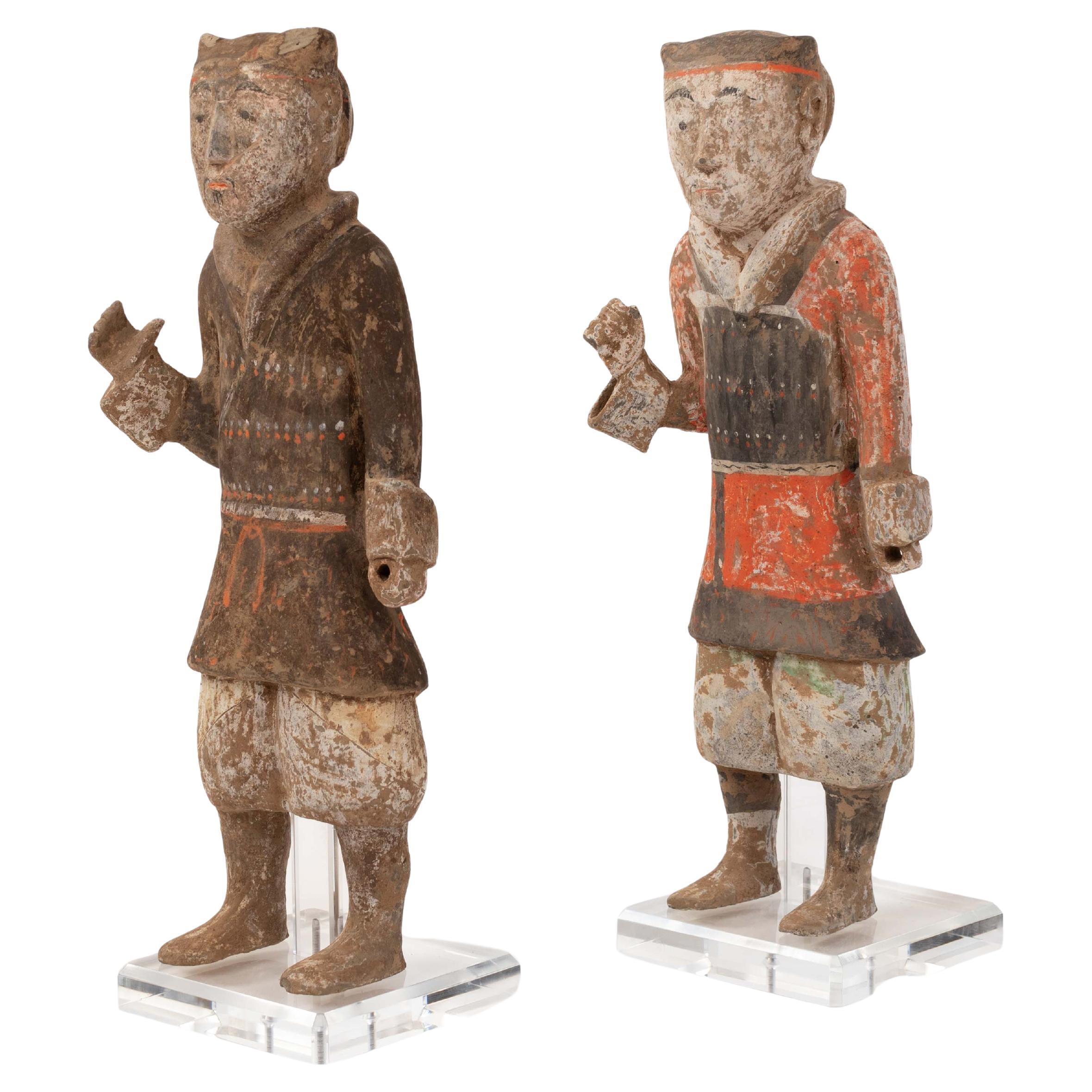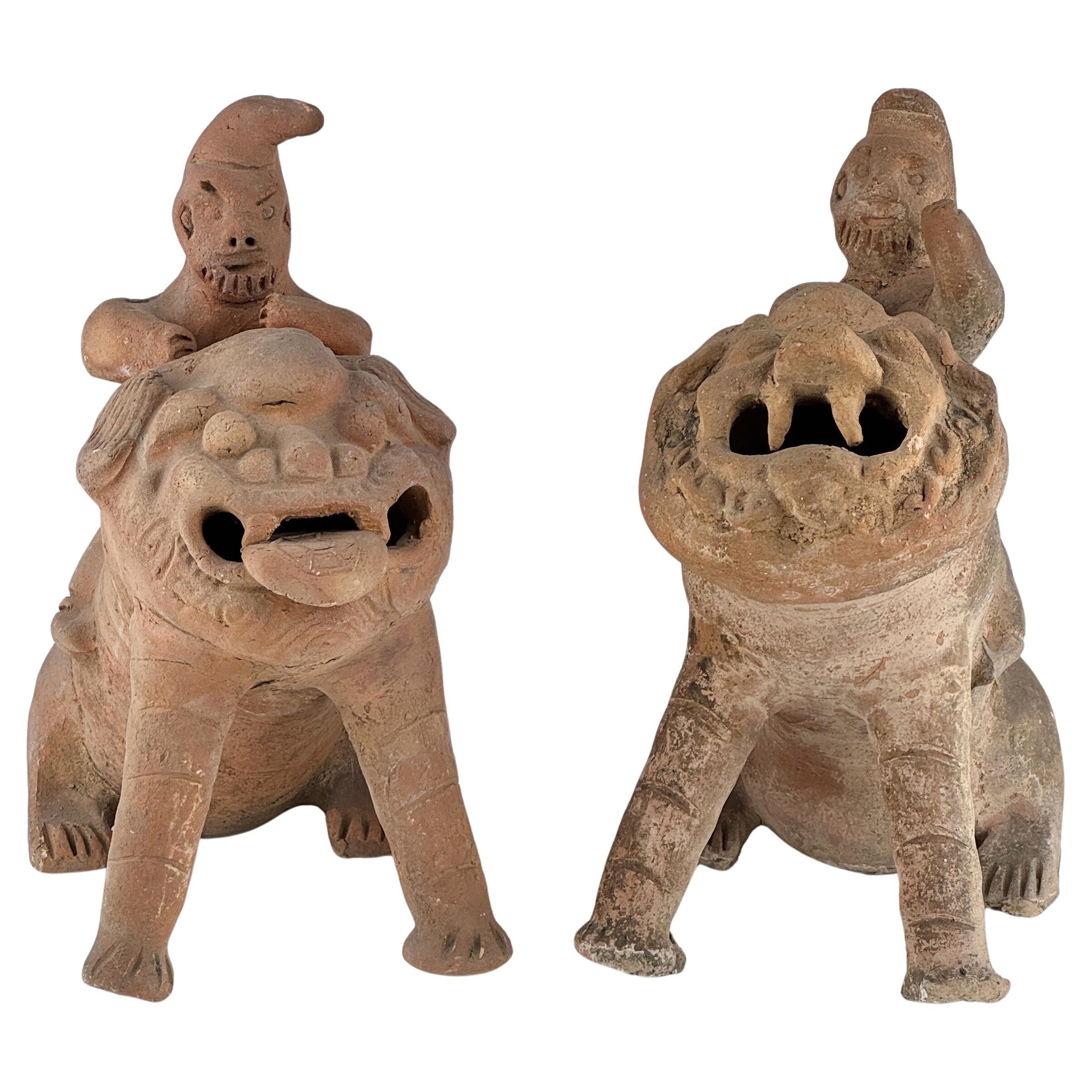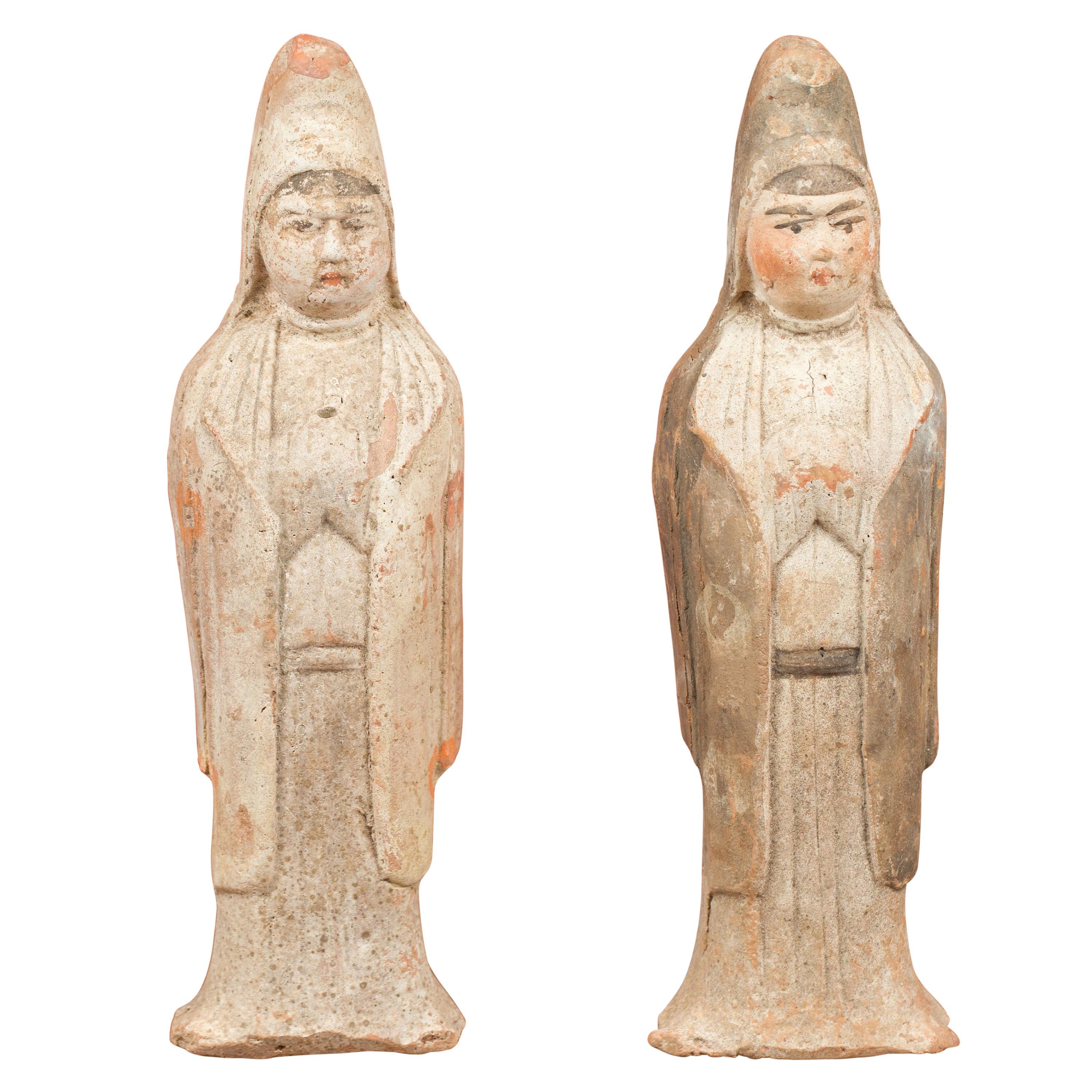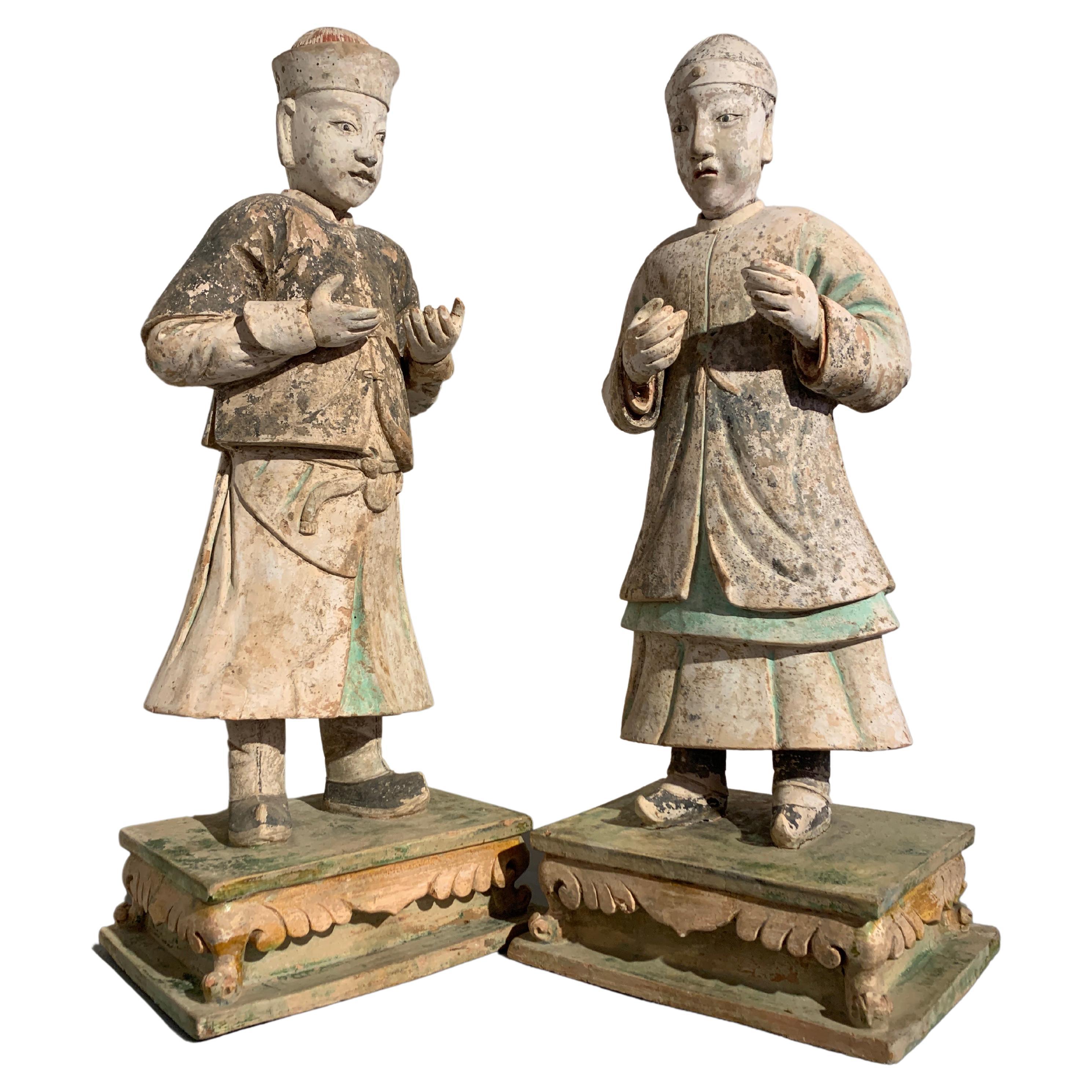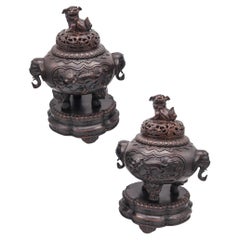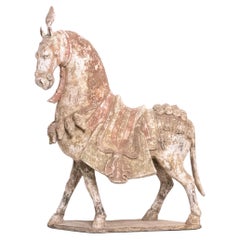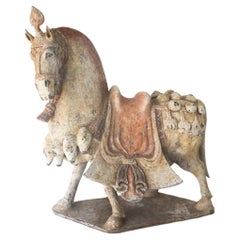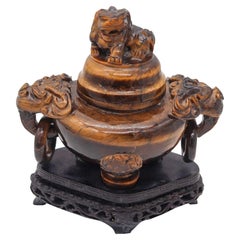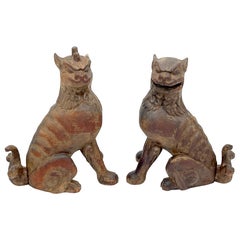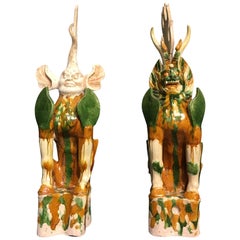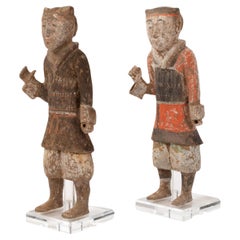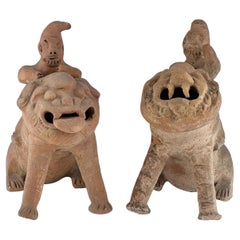Items Similar to China 618-907 AD Tang Dynasty Pair Of Polychromate Earth Spirits Zhenmushou
Want more images or videos?
Request additional images or videos from the seller
1 of 8
China 618-907 AD Tang Dynasty Pair Of Polychromate Earth Spirits Zhenmushou
$4,600per set
$5,750per set20% Off
£3,492.24per set
£4,365.30per set20% Off
€3,994.38per set
€4,992.97per set20% Off
CA$6,426.87per set
CA$8,033.58per set20% Off
A$7,148.08per set
A$8,935.10per set20% Off
CHF 3,732.50per set
CHF 4,665.63per set20% Off
MX$86,984.52per set
MX$108,730.65per set20% Off
NOK 47,669.78per set
NOK 59,587.23per set20% Off
SEK 44,705.85per set
SEK 55,882.31per set20% Off
DKK 29,811.58per set
DKK 37,264.48per set20% Off
Shipping
Retrieving quote...The 1stDibs Promise:
Authenticity Guarantee,
Money-Back Guarantee,
24-Hour Cancellation
About the Item
Pair of Earths Spirits "Zhenmushou" from the China Tang Dynasty 618-907 AD.
A beautiful and rare pair of "Earths Spirits guardians" from the Yunnan province region in the ancient China. This was created in clay earthenware pottery during the Tang Dynasty period between 618 and 907 AD. Featuring the molded figures of two seated guardians with decorations with polychrome pigmentations. The figures are seated on their haunches with cloven hooves planted firmly on the base looking forward with their front legs in a straight position. Both with face and body alert expressions on a rectangular base.
Earth spirits usually appear in pairs, one with a human head and the other with a lion head. Their supernatural powers, indicated by antlers, spiky flanges and flames, enable them to confront evil spirits and protect any precincts within their gaze. Have been believed to protect the living by keeping the spirits of the dead from inappropriately roaming the world outside the tomb.
Zhenmushou or guardian deities, developed from a line of protective spirits found normally in pairs at the front of Tang dynasty tombs. They served both to protect the figure from untoward spirits, and the outside world from the roving spirit of the dead. Combining features from a number of animals to form the perfect mythic beast, these mythical creatures were perceived to be the ideal guardians of the dead
The semi human faced figure has a measures of 11.25 by 4.5 by 5.75 inches (28.57 x 11.43 x 14.60 Cm).
The mythological lion animal figure has a measures of 10 by 5 by 5.8 inches (24.5 x 12.7 x 14.73 Cm).
Tang dynasty or Tang Empire, was an imperial dynasty of China that ruled from 618 to 907, with an interregnum between 690 and 705. It was preceded by the Sui dynasty and followed by the Five Dynasties and Tend Kingdoms period. Historians generally regard the Tang as a high point in Chinese civilization, and a the golden age of cosmopolitan culture. Tang territory, acquired through the military campaigns of its early rulers, rivaled that of the Han dynasty.
The Li family founded the dynasty, seizing power during the decline and collapse of the Sui Empire and inaugurating a period of progress and stability in the first half of the dynasty's rule. The dynasty was formally interrupted during 690–705 when Empress Wu Zetian seized the throne, proclaiming the Wu Zhou dynasty and becoming the only legitimate Chinese empress regnant. The devastating An-Lushan rebellion (755–763) shook the nation and led to the decline of central authority in the dynasty's latter half. Like the previous Sui dynasty, the Tang maintained a civil-service system by recruiting scholar-officials through standardized-examination and recommendations to office. The rise of regional military governors known as Jiedushi during the 9th century undermined this civil order. The dynasty and central government went into decline by the latter half of the 9th century; agrarian rebellions resulted in mass population loss and displacement, widespread poverty, and further government dysfunction that ultimately ended the dynasty in 907.
Chinese pottery, saw many significant developments, including the first Chinese porcelain meeting both Western and Chinese definitions of porcelain, in Ding ware and related types. The earthenware Tang dynasty tomb figures are better known in the West today, but were only made to be placed in elite tombs close to the capital in the north, between about 680 and 760. They were perhaps the last significant fine earthenware’s to be produced in China. Many are lead-glazed Sancai (three-colour) wares; others are unpainted or were painted over a slip; the paint has now often fallen off.
Note: These types of jars were originally excavated from Buddhist sites in the region of Yunnan, China. Used to hold sutras, dedications, or offerings, they were usually buried at the bases of temples, pagodas, or other holy sites.
Collateral: An actual letter, dated October 1, 2021 from TK Asian Antiquities Gallery, signed by Michael Teller, accompanied this piece as a certificate of authenticity. Copy will be included.
Provenance: T.K. Asian Antiquities Gallery, Williamsburg Virginia; A private collection in Palm Beach FL; then purchased by James & Nancy Markell, Virginia 1976; then by descent to Lauren Markland, Fort Lauderdale, FL.; Acquired in Palm Beach, FL. in march 7, 2021.
Literature: Celestial Guardians of Ancient China, Michael C, Teller IV. T.K. Asian Antiquities Gallery, New York 2005. For similar examples.
It is in nice ancient condition, with very minor firing imperfections as usual and remains of the original polychrome pigmentations of white, red and black colors.
INVENTORY REF: D0000ASNN/.1111.
- Dimensions:Height: 11.25 in (28.58 cm)Width: 5.75 in (14.61 cm)Depth: 4.25 in (10.8 cm)
- Sold As:Set of 2
- Style:Tang (Of the Period)
- Materials and Techniques:
- Place of Origin:
- Period:
- Date of Manufacture:618-907 AD
- Condition:Wear consistent with age and use. Literature: Celestial Guardians of Ancient China, Michael C, Teller IV. T.K. Asian Antiquities Gallery, New York 2005. For similar examples. It is in nice ancient condition, with very minor firing imperfections as usual and remains of original color.
- Seller Location:Miami, FL
- Reference Number:Seller: D0000ASNN/.11111stDibs: LU8303233510112
About the Seller
5.0
Gold Seller
Premium sellers maintaining a 4.3+ rating and 24-hour response times
1stDibs seller since 2023
206 sales on 1stDibs
Typical response time: 3 hours
- ShippingRetrieving quote...Shipping from: Miami, FL
- Return Policy
Authenticity Guarantee
In the unlikely event there’s an issue with an item’s authenticity, contact us within 1 year for a full refund. DetailsMoney-Back Guarantee
If your item is not as described, is damaged in transit, or does not arrive, contact us within 7 days for a full refund. Details24-Hour Cancellation
You have a 24-hour grace period in which to reconsider your purchase, with no questions asked.Vetted Professional Sellers
Our world-class sellers must adhere to strict standards for service and quality, maintaining the integrity of our listings.Price-Match Guarantee
If you find that a seller listed the same item for a lower price elsewhere, we’ll match it.Trusted Global Delivery
Our best-in-class carrier network provides specialized shipping options worldwide, including custom delivery.More From This Seller
View AllQING DYNASTY 1800 Early 19th Century Pair of Bronze Censers With Lids & Bases
Located in Miami, FL
An early 19th century dragons censer from the Qing Dynasty.
This is a beautiful antique pair of censers, heavily cast in high relief in the early of the 19th century during the Qing...
Category
Antique Early 1800s Chinese Qing Metalwork
Materials
Bronze
China 549-577 AD Northern Qi Dynasty Ancient Caparisoned Horse in Earthenware
Located in Miami, FL
Extremely rare Chinese pottery caparisoned horse from the Northern Qi region.
A beautiful large sculptural piece, created in China during the Northern Qi dynasty period, between the 549 and 577 AD. This horse statue is extremely finely modeled of earthenware pottery, standing in a very elegant and majestic position striding on a trapezoidal shaped base.
The animal has a gracefully arched neck to the left looking forward and its extremely well modeled. The head is adorned with a large detailed tassels of plumes and the body is embellished with a beautiful saddle and intricate harnesses. The trapping around the chest and rump is adorned with elaborated tassels and the straps are accented with multiples florets and bosses in high relief. Decorated with dotted and circles patterns.
The surface is treated with applications of natural color pigments such; red, white and others.
Has a measurements of 435 mm by 319 mm by 243 mm (17.10 x 12.55 x 9.55 Inches) (43.5 x 31.9 x 24.3 Cm).
Northern Qi, was the successor state of the Chinese Xianbei state of Eastern Wei...
Category
Antique 15th Century and Earlier Chinese Archaistic Antiquities
Materials
Earthenware, Clay, Paint
$30,280 Sale Price
20% Off
China 549-577 AD Northern Qi Dynasty Ancient Caparisoned Horse In Earthenware
Located in Miami, FL
Exceedingly rare Chinese pottery caparisoned horse from the Northern Qi region.
A beautiful sculptural piece, created in China during the Northern Qi dynasty period, between the 549 and 577 AD. This horse statue is extremely finely modeled of earthenware pottery, standing in a very elegant and majestic position striding on a trapezoidal shaped base.
The animal has a gracefully arched neck to the left and its extremely well modeled. The head is adorned with a large detailed tassels of plumes and the body is embellished with a beautiful saddle and intricate harnesses. The trapping around the chest and rump is adorned with elaborated tassels and the straps are accented with multiples florets and bosses in high relief.
The surface is treated with applications of natural pigments such; red, white and others.
Has a measurements of 394 mm by 343 mm by 257 mm (15.53 x 13.52 x 10.15 Inches) (39.4 x 34.3 x 25.7 Cm).
Northern Qi, was the successor state of the Chinese Xianbei state of Eastern Wei...
Category
Antique 15th Century and Earlier Chinese Archaistic Sculptures and Carvings
Materials
Earthenware, Pottery
$31,988 Sale Price
20% Off
QING DYNASTY 20th Century Carved Tiger's Eye Foo-Dog Censer With Cover Lid
Located in Miami, FL
An early 20th century censer from the Qing Dynasty.
This is a beautiful highly detailed small censer, created in the early 20th century during the Qing Dynasty, circa 1910. The cens...
Category
Early 20th Century Chinese Qing Sculptures and Carvings
Materials
Multi-gemstone
Peru Pre-Inca 1270 AD Chimor Pre Columbian Double Face Vessel In Earthware
Located in Miami, FL
Pre Hispanic earth ware vessel from the pre-Inca Chimu culture.
Beautiful ancient vessel, created in northern coast of Peru around the 900 / 1470 AD. by the Chimu culture. This is...
Category
Antique 15th Century and Earlier Peruvian Pre-Columbian Antiquities
Materials
Earthenware, Pottery
$1,400 Sale Price
20% Off
Ota Jinnoei 1890 Imperial Meiji Period Pair of Cloisonne Cabinet Vases
By Ota Jinnoei
Located in Miami, FL
Pair of cloisonne vases designed by Ota Jinnoei.
Beautiful pair of small cabinet vases, created in Japan circa 1890, during the meiji Imperial period (1868-1912). These vases has ...
Category
Antique 1890s Japanese Meiji Metalwork
Materials
Silver, Bronze, Enamel
$1,996 Sale Price / set
20% Off
You May Also Like
Pair of 19th C. Tibetan Carved Wood & Polychromed Foo/ Guardian /Temple Dogs
Located in West Palm Beach, FL
A unique and enchanting pair of 19th Century Tibetan carved wood & polychromed foo/guardian/temple dogs. These mythical Buddhist temple dogs, also known as "foo dogs" or "lion dogs,"...
Category
Antique 19th Century Tibetan Tibetan Sculptures and Carvings
Materials
Wood
Pair of Tang Dynasty Sancai Glazed Tomb Guardians, Zhenmushou, 7th-8th Century
Located in Austin, TX
A fantastic and powerful pair of Chinese Tang Dynasty three-color (sancai) glazed zhenmushou, tomb guardian figures, late 7th or early 8th century. TL t...
Category
Antique 15th Century and Earlier Chinese Tang Sculptures and Carvings
Materials
Earthenware
Pair of Terracotta Han Guards in Polychrome Paint China Han-Dynastie, TL Tested
Located in Salzburg, AT
Pair of terracotta Han guardsmen in polychrome paint China TL tested
Pair of rare standing male terracotta sculptures/warriors of the Chinese Han dynasty from the 2nd century BC.
W...
Category
Antique 15th Century and Earlier Chinese Han Figurative Sculptures
Materials
Terracotta, Acrylic
Pair of Rider Figures on Mythical Beasts Possibly from Qing Dynasty
Located in seoul, KR
Identical piece is housed in the Longhai Museum of Zhangzhou City. On October 7, 1989, it was appraised as a third-class cultural relic by the Cultural Relics Appraisal Team of the F...
Category
Antique 17th Century Hong Kong Qing Antiquities
Materials
Pottery
$2,275 Sale Price / set
35% Off
Pair of Qing Dynasty Early 20th Century Small Hand Painted Terracotta Statues
Located in Yonkers, NY
A pair of Qing dynasty 20th century terracotta Chinese hooded priestess sculptures with original paint. Discover the exquisite charm of this pair of 20th century Qing dynasty terraco...
Category
Early 20th Century Chinese Qing Sculptures and Carvings
Materials
Terracotta
Pair Large Chinese Ming Dynasty Glazed and Painted Pottery Figures, 16th Century
Located in Austin, TX
A striking pair of large Chinese glazed and painted pottery figures, Ming Dynasty (1368 to 1644), circa 16th century, China.
The impressive and realistically modeled figures each portrayed standing upright upon a sancai (three color) glazed pedestal of kang table form.
The man is dressed in a short black surcoat over a long robe and pants, a smart cap upon his head. His face is warm and welcoming, with wide eyes and a slight smile on his lips. He holds his hands out in front of him, palms up, almost as if shrugging, though presumably originally holding an object or offering, now lost.
The woman of slightly smaller stature, and dressed in a longer surcoat over a long robe and skirt. She wears a fitted cap upon her head. Her hands also held out in front, grasping long lost objects. Her face is slightly more severe, with a somewhat pinched look, and slight frown upon her lips.
The size of these figures is remarkable, as is the realism and attention to detail, almost as if they were modeled after real people, as opposed to the more common and generic Ming Dynasty pottery...
Category
Antique 16th Century Chinese Ming Sculptures and Carvings
Materials
Pottery
More Ways To Browse
Dynasty Fine China
Semi China
Antique Chinese Earthenware
Red Chinese Pottery
Chinese Deity
Chinese Ding
Chinese Seated Figure
Chinese Pottery Figure
Pottery Lion
Virginia Galleries Furniture
Antique Lead Figures
Imperial Lion
Chinese Sancai
Chinese Red Jars
Virginia Galleries
Porcelain Chinese Pagoda
Chinese Lion Head
Chinese Throne
